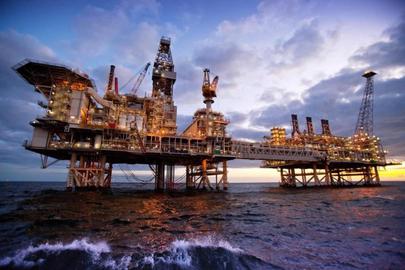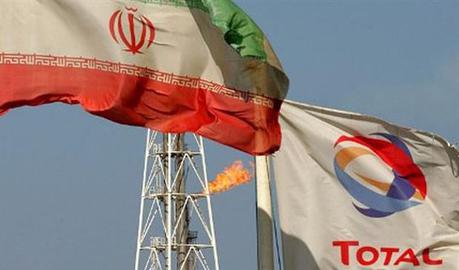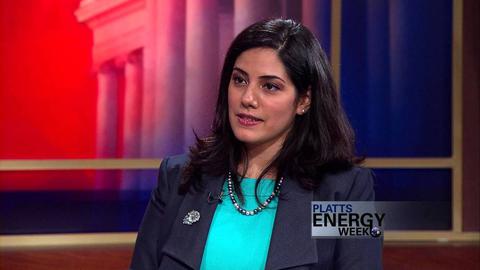Iran’s $4.8 billion contract with French oil giant Total will develop Phase 11 of the Persian Gulf gas field South Pars, and when it goes online — in just under three and a half years — it will add 56 million cubic meters to Iran’s daily gas production capacity. The deal is the first major Western energy investment in Iran since sanctions linked to Iran’s nuclear program were lifted.
South Pars holds 8 percent of the world’s known gas reserves and borders on the Qatari field North Dome. Total will own 50.1 percent of the shares for the contract. Of the remaining shares, 30 percent will go to the China National Petroleum Company (CNPC) and 19.9 percent to PetroPars Oilfield Services Company, a subsidiary of Naftiran Intertrade Company (NICO), which in turn operates under the umbrella of the National Iranian Oil Company (NIOC).
But the fact that PetroPars will own the minority of the shares has led to widespread criticism of the deal. Some opponents, including many anti-Rouhani conservative hardliners, have used the deal to attack the president’s administration and those involved with the Total deal, and some have tried to derail the agreement in parliament on constitutional grounds.
In the fifth article in our Total series, we talked with Sara Vakhshouri, a Senior Fellow at the Atlantic Council’s Global Energy Center and an expert on global energy markets and energy security. We asked: Do critics of the Total deal actually have a point?
Read part one, part two, part three and part four in the series.
Iranian government officials say that PetroPars will own 19.9 percent of the shares because it does not have more capital at its disposal. They also claim that that the other two partners, Total and the Chinese National Petroleum Company, offered PetroPars a bigger share but that PetroPars could not afford it. PetroPars is a state-owned company, a subsidiary of the Iranian National Oil Company, which owns the project. Was it not in the interests of the NIOC and the Iranian government to provide more funds to PetroPars so it could have a bigger share?
This question assumes that Total’s larger share in the consortium means that the NIOC has no control over the project. Three companies have formed a consortium and each has a share equal to its investment amount and contribution in the project. Here the consortium plays the role of a larger company that is a party to the contract with the NIOC. No matter how big Total’s share is in the consortium, it is the NIOC that, as the contract owner, has the overall control of the project.
Critics claim the contract gives complete control to Total, not only in terms of exploration and development, but also when it comes to production and utilization. This suggests that Total controls a contract that has been imposed on Iran.
Iran has not granted complete control of the project to Total. In technical matters, Total can decide which direction to take because it has the technology and the experience. But in macro-decisions, the Iranian National Oil Company will be able to have control and influence.
Why was Total insistent on having a share of over 50 percent? It could have agreed to 49 percent or even lower. If, as you say, the project is under the ultimate control of the NIOC then why is Total’s share this high?
This is an internal question for the consortium, which decided how things should be carried out. The dominant share of Total gives this company a higher role and influence in the consortium, but the whole consortium works for the Iranian National Oil Company. Iranian companies like PetroPars that work alongside foreign companies lack both sufficient capital and high [levels of] technology. If PetroPars had over 50 percent of the shares then it would have to bring in a comparable amount of capital and technology, and this was not practical for PetroPars. Having an Iranian company in the consortium along with other international companies is for the purpose of learning the job and the technology transfer clause in the contract.
What about technology transfer? It does not happen by itself, and is subject to Total’s decisions. It is possible that Total will not go along with it. For example, according to details that have been made public, Iranian government officials say that 50 to 70 percent of sub-projects would be implemented by Iranian companies, but Total’s CEO has said that it will farm out 50 percent of the supply work to Iranian companies. It is a long way from supplying the project to implementing it. When even at this early stage Total does not support statements issued by Iranian oil officials, what is the guarantee that it will agree with the far more important topic of technology transfer?
The question of technology transfer is not something specific to the Iran Petroleum Contract (IPC). Iran’s previous upstream investment “buy-back” contracts also had a similar clause for transferring technology. PetroPars had previously worked with Total in Phases 2 and 3 of the South Pars project, and with the Italian oil company Eni in Phases 4 and 5. Subsequently, PetroPars was able to do Phase 1 of development by itself. So during these years, Iran had a successful experience of obtaining technology from international oil companies.
You have mentioned that Iranian companies do not have the necessary technology. Iran’s oil minister has explicitly complained about the quality of Iranian companies’ work, as well as the length of time it has taken them to carry out this work. This stems from these companies’ low technological capabilities.
Technology transfer does not happen overnight, and it’s never 100 percent. You cannot expect that when the contract is done PetroPars will turn into another Total. You cannot work with a pottery master for a short while and become a master yourself. You can only learn some of the skills.
But this is not just about one contract. Total was in Iran for two decades and has worked with Iranian companies, but it seems that this partnership has come to naught, perhaps because big companies like Total do agree to help with technology transfer, but then practically nothing happens.
Development of Phase 1 of South Pars, which was done by PetroPars, took a longer time and was done with a lower efficiency rate in comparison to other Phases, which were developed by international companies. However, the company has learnt the job from international companies and could successfully complete a similar project on its own. Also, we must take into account the fact that companies like Total develop and update their technologies rapidly and also use some American technologies. Hence, because of US sanctions, some of these technologies could not be transferred. We must recognize that technology transfer is not measurable. Transfer could take place at a level that would enable, for example, PetroPars to take on a similar project, but it is unrealistic to expect that PetroPars would be able to obtain 100 percent of Total’s technology. Not being able to transfer 100 percent of Total’s technology to PetroPars under this contract is neither a sign of the NIOC’s weakness, nor a sign of Total’s wickedness. Technologies are changing all the time. You cannot expect a high level of technology transfer in a timeframe that resembles a school semester.
The other discussion is about the confidentiality of Total’s contract with Iran. Some hardliners have said that while you can find Senegal’s contract with Total via an internet search, its contract with Iran is confidential, and many Iranian officials do not know anything about it. Has Total behaved differently when working with other countries?
Perhaps you can find the general outlines of the contracts on the internet, but the full details of any contract are never disclosed to the public. It is possible that the Iranian National Oil Company has given copies [of the full contract] to various agencies — for example to the representative of the office of the Supreme Leader — but we can’t expect the NIOC to publicly disclose the full details of the contract. Such a public disclosure is against the interests of both parties. If the full details of the contract were made public, then Iran would have to follow the same provisions and [provide] the same terms to other parties in future contracts. This is a case for most countries. For example, you cannot do a search on the internet and find details of upstream investment contracts for developing Saudi Arabia’s oil fields.
The other objection is that Total might pass on confidential information about Iranian oil and gas fields to other countries. Opponents of the government claim that Total has done this at least once, passing information to Qatar about Iran, and that Total has close relations with countries that are hostile to Iran. What do you think about this?
The confidentiality and non-disclosure agreement to safeguard information is part of any contract. Depending on the duration and terms of the non-disclosure agreement, this information cannot be divulged to others. This is a legal issue and it is a matter of credibility for a large company like Total. If any information leak happens, Iran can file a legal complaint [for breach of contract] against Total. Total could not and would not share the exact data and the information that it has received from the NIOC with other parties. However, it could share any analyses or estimates concluded and generated by itself to others. Nobody can stop this.
We are talking about a gas field jointly owned by Iran and Qatar. These two countries are in serious competition to exploit the field. After signing its contract with Iran, Total also agreed a contract with Qatar. Can’t sharing the data and estimates, even when Total has independently arrived at them, hurt the interests of the NIOC?
Yes, it could be against Iran’s interest. First I would like to note that it is not difficult for Qatar to have its own estimates and technical evaluations of what is happening on the Iranian side. Total working on Phase 11 of South Pars will give this company a clear understanding of the reservoir in Iran’s side and this could be very important and helpful for its work on the other side of the border in Qatar. But it's important to understand that the main interest and priority of the NIOC is to develop and produce resources from this shared field as fast and as much as possible. To accomplish this, it needs the technology and capital of international oil companies. Under the current status quo, when international companies have been hesitant and slow in moving to Iran, the NIOC didn’t have other options besides Total. There are all kinds of risks but if Iran wants to prioritize its interests, it must focus on developing and extracting resources from this shared field as much as possible.
So what about the connection between this contract and sanctions? Critics warn that if new sanctions are imposed by the United States, Total might abandon Iran. Iran’s oil minister has told parliament that this is true, but that contracts like this will tie sanctions to the economic interests of countries like France and China, and they can either prevent new sanctions or counteract their effects. But the truth is that in 2010, Total and many other companies were in Iran. When the sanctions were implemented, they left Iran and their governments did nothing.
Well, when President Clinton implemented Iran’s Sanctions Act, Total signed upstream investment contracts with Iran to develop Siri A and E fields as well as Phase 2 and 3 of South Pars. Other non-US companies also followed Total.
But when sanctions were extended, these companies left Iran. Couldn’t this happen again?
In 2012, not only the US but also the EU and the UN increased and implemented many different sanctions on Iran. During that time an international consensus happened against Iran’s nuclear program, and even Japan, India, China and Russia complied with Iran sanctions. Now it is a different situation. Iran has kind of returned back to Clinton’s era, meaning that American sanctions affect American companies only— but other non-US companies are not forced to abide by these sanctions. If Iran’s nuclear or missile programs and policy do not move in a way that means another international consensus takes shape, then non-US investors could legally invest in Iran.
During international sanctions, Rostam Ghasemi, former president Mahmoud Ahmadinejad’s oil minister, offered a production-sharing contract to ONGC of India for developing the Farzad-B Gas Field. A production-sharing contract is very attractive for international oil companies, because, simply, they are much more flexible than the buy-back or Iran Petroleum Contract (IPC) model [which has been used in the Total deal]. Hence, Iran’s oil minister at that time, when Iran was under massive pressure and sanctions, offered a production-sharing contract to an Indian company to encourage it to invest in Iran.
This indicated that hardliners in Iran are very well aware of the fact that more flexible contracts are the best option to encourage international investors to take different levels of investment risks in Iran.
Read the other parts in the series.
Why do Hardliners Hate Iran’s Deal with Total?
Hardliners Slam Total Deal — But are Claims of Corruption and Further Sanctions Untrue?
visit the accountability section
In this section of Iran Wire, you can contact the officials and launch your campaign for various problems




























comments